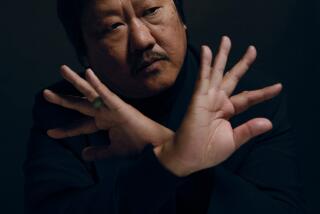Fighting for a comeback
- Share via
Hong Kong — It was the little dynamo of Hong Kong that jump-started the action film genre, starting in the late ‘80s with a series of films that reflected the explosive energy and recklessness of a society in economic and political transition. But the film business there today is a far cry from what it was in its heyday.
At its height the Hong Kong industry produced nearly 300 films a year -- third in line behind India and the United States. But then came the fall, too many sloppily produced films disappointed too many viewers, who increasingly looked to slick Hollywood products. Now there are efforts to revive the business.
In the ‘80s, directors John Woo (“A Better Tomorrow,” “The Killer”) and Tsui Hark (“Peking Opera Blues,” “Once Upon a Time in China”), sometime collaborators, led the way. Their films were breathlessly paced and set up real-life stunts Hollywood wouldn’t dream of subjecting stars to, let alone professional stuntmen.
Jackie Chan fell down a five-story-high atrium, Michelle Yeoh drove a motorcycle onto a moving train. This was possible partly because no liability underwriter was looking over the producers’ shoulders, and partly because of the imagination of Hong Kong directors backed by action choreographers, such as Sammo Hung and Ching Siu-tung, many of who trained in the bare-handed acrobatics of Chinese opera. In that golden era, Hong Kong film dominated Asian theaters and Hong Kong stars were Asian stars, from Taiwan to Thailand.
By the early 1990s Hong Kong directors were courted by the West to make English-language films. The roster included Ringo Lam, Stanley Tong and Kirk Wong -- as well as Tsui, who’s directed two Jean-Claude Van Damme films, and Woo, who has been so successful making the transition that he’s now a Hollywood fixture.
More recently, Hong Kong action choreographers have been hired to bring that wow factor to Western films. The most notable is Yuen Woo-ping, who catapulted to international fame with the Wachowski brothers’ “Matrix” and Ang Lee’s “Crouching Tiger, Hidden Dragon.”
While Lee is Taiwan born, he oversaw a cast of mainland Chinese, Hong Kong and Taiwan actors, shooting in the Beijing Film Studio and on location in China, with production funding from Hong Kong. And, significantly, he insisted on showing the film in Chinese -- anathema to distributors until then. Investors are now not only willing to put money into the martial arts genre, they’ll put up plenty of it.
“I’d been thinking about making a martial arts film for a long time,” says Zhang Yimou, director of “Hero,” which opens Friday, by telephone from Beijing, “and we began working on scripts for one even before ‘Crouching Tiger’ was released. But I really do have to thank ‘Crouching Tiger’ for one thing -- it made seeking funding so much easier for my film.”
The estimate for this year’s production will be just under 100 films, but the industry is making a small comeback, signaled by two very different films, “Infernal Affairs,” a taut police thriller that will be released here this fall, and last year’s megahit “Twins Effect,” which follows the adventures of young women battling vampires and which probably will never be released here.
Careful scripting and production planning are increasingly the norm. In the past, Hong Kong films were notorious for starting production with a bare outline, then having pages distributed just before the day’s shooting. In today’s environment, this serendipitous style is far too expensive -- and too unpredictable -- and only someone like Wong Kar-wai, the darling of world art-house cinema, hero to Sofia Coppola and Quentin Tarantino, could get away with it. Apparently cutting till the last minute, Wong was so late delivering “2046” to Cannes that it missed the major morning screening -- unheard-of in a film in competition.
Meanwhile, the Chinese government has announced a new program to help the Hong Kong film industry, which frees Hong Kong films from the quota system (only a limited number of foreign films can be released in China each year, and Hong Kong films used to be put in that category) and facilitates co-productions.
Although the mainland market is potentially lucrative, box office accounting remains problematic and all releases must be examined for suitable content. “There won’t be horror films, for example, because ghosts are considered superstitious,” says Peter Tsi, former head of the Hong Kong Motion Pictures Industry Assn.
More to Read
Only good movies
Get the Indie Focus newsletter, Mark Olsen's weekly guide to the world of cinema.
You may occasionally receive promotional content from the Los Angeles Times.









